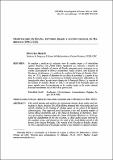Por favor, use este identificador para citar o enlazar a este item:
http://hdl.handle.net/10261/15834COMPARTIR / EXPORTAR:
 SHARE
BASE SHARE
BASE
|
|
| Visualizar otros formatos: MARC | Dublin Core | RDF | ORE | MODS | METS | DIDL | DATACITE | |

| Campo DC | Valor | Lengua/Idioma |
|---|---|---|
| dc.contributor.author | Marín Niño, Manuela | - |
| dc.date.accessioned | 2009-08-07T11:16:40Z | - |
| dc.date.available | 2009-08-07T11:16:40Z | - |
| dc.date.issued | 2009-04-30 | - |
| dc.identifier.citation | Hispania 69(231): 117-146 (2009) | en_US |
| dc.identifier.issn | 0018-2141 | - |
| dc.identifier.uri | http://hdl.handle.net/10261/15834 | - |
| dc.description | 30 páginas. | en_US |
| dc.description.abstract | [ES] Se estudian y analizan las relaciones entre los estudios árabes y el colonialismo español. Arabistas como Julián Ribera impulsaron esas relaciones y trataron de formar agentes coloniales al servicio del Estado, apoyando varias iniciativas en ese sentido y participando en diversas instituciones creadas al efecto, como la Junta de Enseñanza de Marruecos. La salida de los arabistas del Centro de Estudios Históricos, en 1916, propició el abandono de esta línea de actividad, y a partir de esa fecha los estudios árabes se concentraron en el ámbito universitario, dedicándose a la investigación sobre el pasado árabe-islámico de la Península Ibérica. La creación de las Escuelas de Estudios Árabes en 1932 y en especial la de Granada supuso un nuevo impulso para la participación de los estudios árabes en la acción colonial, frustrado nuevamente tras el inicio de la guerra civil. | en_US |
| dc.description.abstract | [EN]This article presents and analyzes the relationship between Arab studies and colonialism in Spain. Arabists like Julián Ribera promoted this relationship and were actively involved in the training of ‘colonial agents’ in the service of the Spanish administration. They supported several initiatives to this end, becoming members of various official institutions such as the ‘Junta de Enseñanza de Marruecos’. However, the Arabists’ departure from the ‘Centro de Estudios Históricos’ in 1916 signalled the abandonment of this line of action, as Arab studies became restricted to the academic arena, and focussed on the study of the Arab-Islamic period in the history of the Iberian Peninsula. The creation of the ‘Escuelas de Estudios Árabes’ in 1932, especially that of Granada, marked a new initiative in Spanish arabists’ attempts at colonial involvement. However, this new project was brought to an abrupt halt by the Spanish Civil War. | en_US |
| dc.format.extent | 167161 bytes | - |
| dc.format.mimetype | application/pdf | - |
| dc.language.iso | spa | en_US |
| dc.publisher | Consejo Superior de Investigaciones Científicas (España) | en_US |
| dc.rights | openAccess | en_US |
| dc.subject | Arabismos | en_US |
| dc.subject | Orientalismo | en_US |
| dc.subject | Colonialismo | en_US |
| dc.subject | España | en_US |
| dc.subject | Siglos XIX-XX | en_US |
| dc.subject | Arab Studies | en_US |
| dc.subject | Orientalism | en_US |
| dc.subject | Colonialism | en_US |
| dc.subject | Spain | en_US |
| dc.subject | 19th-20th centuries | en_US |
| dc.title | Orientalismo en España: estudios árabes y acción colonial en Marruecos (1894-1943) | en_US |
| dc.title.alternative | Orientalism in Spain: Arab studies and colonialism in Morocco (1894-1943) | en_US |
| dc.type | artículo | en_US |
| dc.description.peerreviewed | Peer reviewed | en_US |
| dc.relation.publisherversion | http://hispania.revistas.csic.es/index.php/hispania/article/view/101 | en_US |
| dc.identifier.e-issn | 1988-8368 | - |
| dc.type.coar | http://purl.org/coar/resource_type/c_6501 | es_ES |
| item.cerifentitytype | Publications | - |
| item.openairecristype | http://purl.org/coar/resource_type/c_18cf | - |
| item.grantfulltext | open | - |
| item.openairetype | artículo | - |
| item.fulltext | With Fulltext | - |
| item.languageiso639-1 | es | - |
| Aparece en las colecciones: | (CCHS-ILC) Artículos | |
Ficheros en este ítem:
| Fichero | Descripción | Tamaño | Formato | |
|---|---|---|---|---|
| 103.pdf | 163,24 kB | Adobe PDF |  Visualizar/Abrir |
CORE Recommender
Page view(s)
454
checked on 27-abr-2024
Download(s)
533
checked on 27-abr-2024
Google ScholarTM
Check
NOTA: Los ítems de Digital.CSIC están protegidos por copyright, con todos los derechos reservados, a menos que se indique lo contrario.
